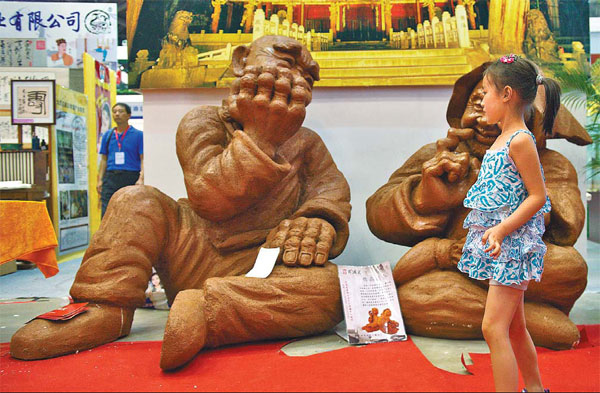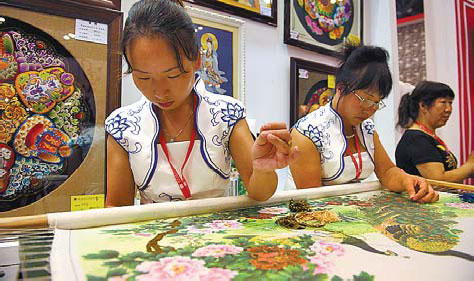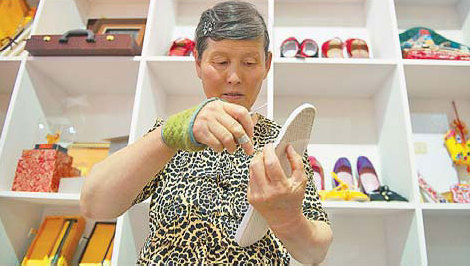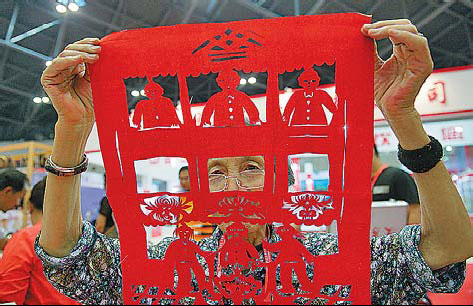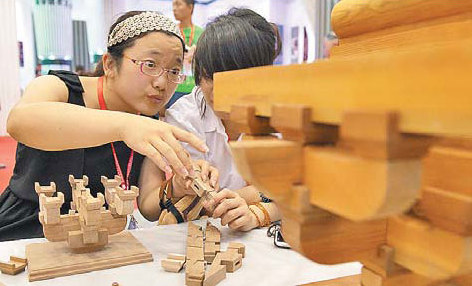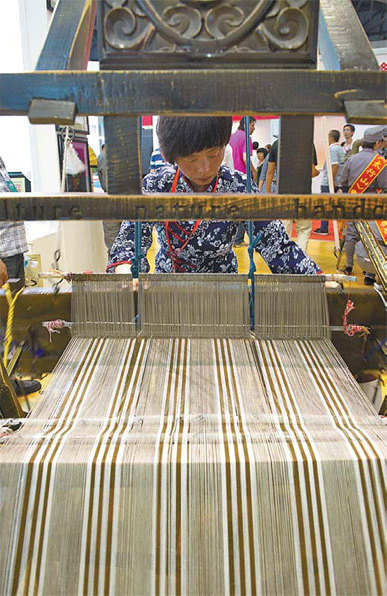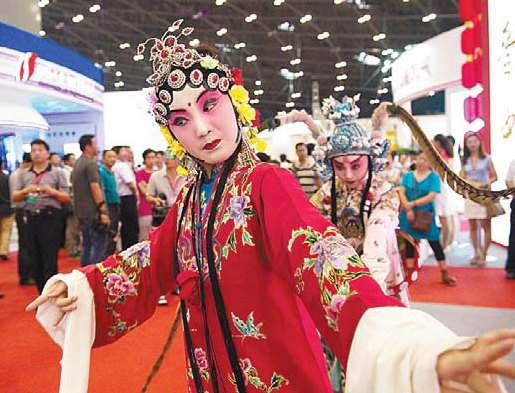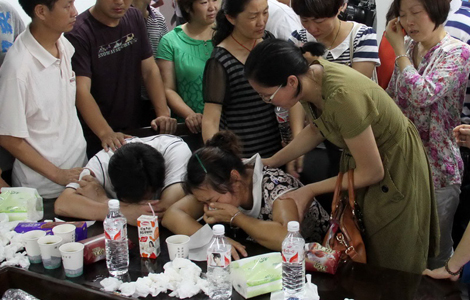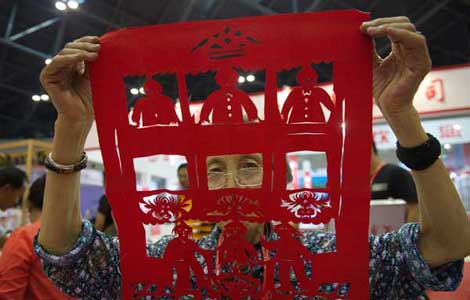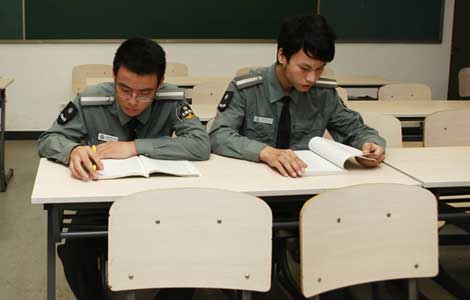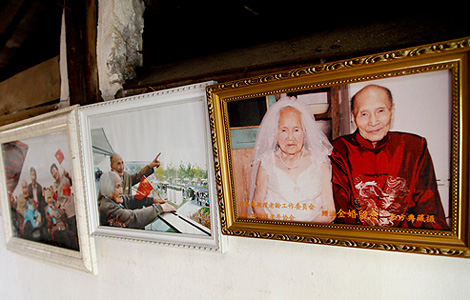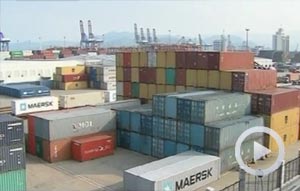Showing off in Shanxi
Updated: 2013-07-08 07:44
By Chen Liang and Sun Ruisheng (China Daily)
|
||||||||
|
Two clay sculptures made by folk artisans at the First Shanxi Cultural Industries Fair attract the attention of a young visitor. Photos by Wei Xiaohao / China Daily |
|
Needlewomen from the embroidery center run by Fan Suping, a craftswoman from Heshun county, Shanxi province, demonstrate their skill at the fair. |
|
A craftswoman concentrates on stitching the soles of handmade cloth shoes at the fair. |
|
Liu Guilan, from Lyuliang city, shows her paper-cutting works, which are simple, indigenous and full of country naivete. |
|
Shanxi Museum's staff members work on the "toy bricks", miniature wooden blocks. |
|
Weaving on a traditional loom can also be an art. |
|
Local opera artistes entertain visitors. |
Tradition and culture were the main attractions recently at the ancient city of Taiyuan. Chen Liang and Sun Ruisheng tell us which were the main acts.
There were contemporary dancers and pop singers performing onstage. Opera artistes were showing off their exquisite make-up and costumes. Musicians attracted crowds with their skill on traditional instruments, such as the pipa and erhu.
In spite of the clamor caused by these shows and their audiences, there were also craftsmen concentrating on making paper-cuts, New Year woodblock prints, or paper-making for Chinese painting and calligraphy, stitching soles of handmade cloth shoes, embroidering, building "toy bricks" (miniature wooden bracket sets of the Song Dynasty (967-1279) style), and even brewing vinegar - all at the same place.
This was the First Shanxi Cultural Industries Fair held at the Coal Trade Center in Taiyuan, Shanxi province, from June 29 to July 3.
Organized mainly by the Shanxi Provincial Publicity Department and Taiyuan municipal government, the fair attracted 900 cultural enterprises locally and more than 200 from other provinces, autonomous regions, Hong Kong and Macao. Some foreign countries also participated the event.
All in all, more than 10,000 cultural products were gathered at the fair.
Many from Shanxi are actually private-owned businesses run by folk artisans. Some of them are the province's intangible cultural heritage inheritors.
These folk artists and craftsmen showed off their crafts and products at the packed exhibition center. For many of them, this was also a rare opportunity to present their crafts to the outside world.
Liu Guilan, 74, had already visited Taiyuan twice before, but this time she came with paper-cutting skills she had been honing for nearly half a century.
From Chugou village in Liulin county, Lyuliang city, Liu and her husband were sent to the fair by the city government.
Her works, made of red paper and with traditional country themes, are priced from 50 to 300 yuan ($8-49), depending on the size. Unlike the new-style paper-cutting works at the fair, her works are simple, indigenous and full of country naivete.
"My works are mainly for the weddings in local families," Liu says in her strongly accented Mandarin. "They like my paper-cuts on newly weds worshiping Heaven and Earth. A small piece can sell for 200 to 300 yuan. A big piece is priced at 1,200 yuan."
It takes her more than a month to finish a big piece, she says, so she can only earn between 3,000 to 5,000 yuan a year.
"I hope I could sell more at the fair," she says.
By letting more people know about her works, she says she also hopes to become one of the country's intangible cultural heritage inheritors, which means an allowance of 10,000 yuan from the central government every year.
Near Liu's table, Hu Zhiqi and his son Hu Xiao were at the fair to promote their family tradition - woodblock New Year prints. Their family business has survived for four generations, says the 28-year-old son.
With a collection of about 40 sets of woodblocks, some of which are more than 100 years old, the family is the only traditional New Year woodblock print maker in Liulin county.
In 2008, Hu Xiao, an artist with formal art education, took the family's woodblock prints to Jaipur, India.
"In Liulin, few people would buy our New Year prints, which are priced at 50 to 100 yuan each and more expensive than common printed New Year paintings," Hu says.
But he manages to sell about 1,000 prints a year to collectors mainly through his shop at Taobao.com, China's largest online shopping portal.
"I hope to meet potential traders and more collectors at the fair."
Near the entrance of the trade center, Guo Meihua had a prominent position to promote her paper-cuts, already well known in the province.
One of the province's top folk artists and paper-cutting masters, Guo attended the fair to exhibit a few of her award-winning paper-cuts and demonstrate her unique style of cutting and pasting on black, white and red paper. Her art is a blend of traditional paper-cutting with modern design and innovation.
The 48-year-old master turned her booth into a hot spot by doing small paper-cutting portraits free for visitors.
Like Guo, Fan Suping also thought the fair was an excellent opportunity to display her art, which is Shanxi-style embroidery. She displayed a few of her award-winning works on the wall of her booth.
The craftswoman from He-shun county hopes to promote her art to a broader audience.
Shanxi-style embroidery is sewn on layered linen.
"The cloth, pasted together one layer after another, is very hard and thick," she says. "So it's much harder to embroider on.
"It will take a skillful needlewoman one day to make just one small flower. To finish a half-square-meter work, it might take me two or three years."
Running a handmade embroidery center with about 60 employees, including about 20 part-timers, Fan says she is often short handed.
On the first morning of the fair, she closed an order of 2,000 pairs of innersoles with Shanxi embroidery. "It will be innersoles with our best-quality embroidery, which will cost 500 yuan a pair," Fan says.
She wants to recruit and train about 200 students from other parts of the province as it is "the only way to raise Shanxi embroidery to another level of development".
Fan was not the only one who went home with large orders. According to the fair organizers, the first day of the event resulted in contracts worth about 73.5 billion yuan.
"This shows that investors from home and abroad are very aware of the great potential of our cultural industries," says Hu Suping, director of the Shanxi Provincial Publicity Department.
Cheng Hong contributed to the story.
Contact the writers through chenliang@chinadaily.com.cn.
(China Daily USA07/08/2013 page10)
Most Viewed
Editor's Picks

|

|

|

|

|

|
Today's Top News
Boeing 777 passenger 'mumbled a prayer'
Ex-minister gets suspended death
Workers return after dispute
Job seekers should be cautious abroad
River pollution sparks criticism
Terror attack was planned: suspect
Booming security industry needs skilled youth
A bright future for native black pigs?
US Weekly

|

|
